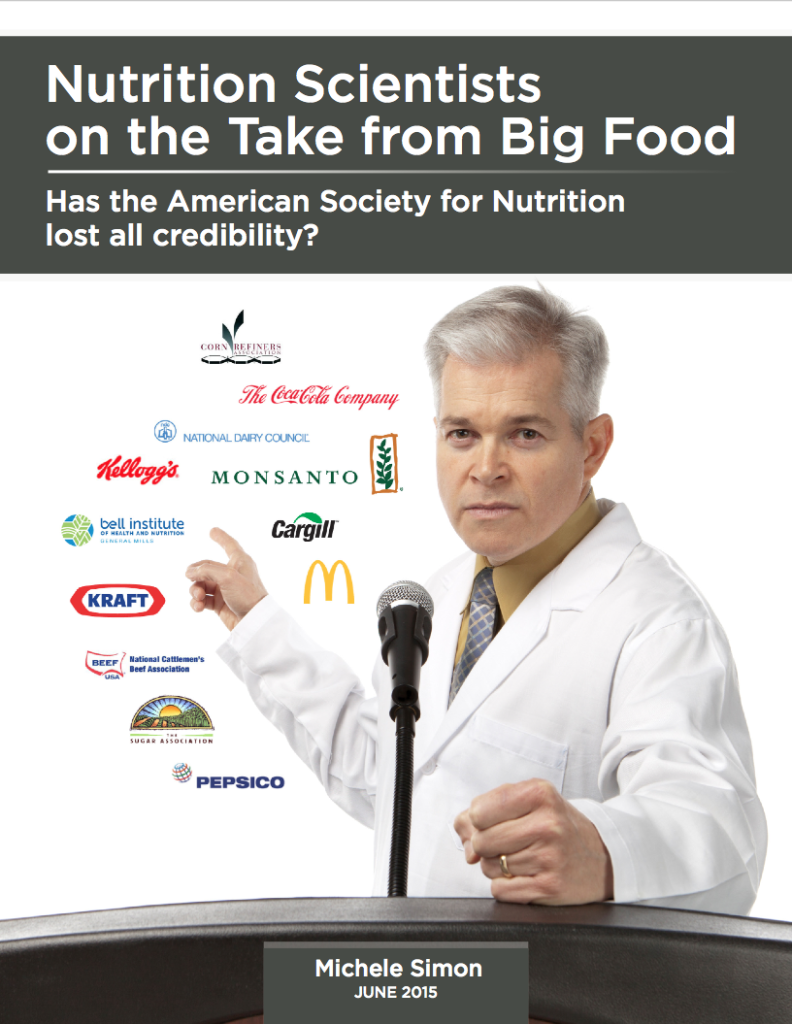Another five food industry-sponsored studies with food industry-favorable results
Here’s my latest collection of five research studies paid for by a food manufacturer who can use the study results for marketing purposes. My point: industry-sponsored studies invariably appear to favor the sponsor’s marketing interests.
I am not looking for sponsored studies in any systematic way. They just appear.
I very much would like to find sponsored studies that produce results contrary to the sponsor’s interests. If you see any, please send.
In the meantime, here’s the latest collection.
Cooked oatmeal consumption is associated with better diet quality, better nutrient intakes, and reduced risk for central adiposity and obesity in children 2-18 years: NHANES 2001-2010. Carol E. Carolyn E. O’Neil,, Theresa A. Nicklas, Victor L. Fulgoni, III and Maureen A. DiRienzo. Food & Nutrition Research 2015, 59: 26673
- Conclusion: Consumption of oatmeal by children was associated with better nutrient intake, diet quality, and reduced risk for central adiposity and obesity and should be encouraged as part of an overall healthful diet.
- Sponsor: PepsiCo (owner of Quaker Oats); the lead author is a member of the Kellogg’s Breakfast Council.
Including “Added Sugars” on the Nutrition Facts Panel: How Consumers Perceive the Proposed Change. Idamarie Laquatra, Kris Sollid, Marianne Smith Edge, Jason Pelzel, John Turner. Journal of the Academy of Nutrition and Dietetics, June 9, 2015. doi:10.1016/j.jand.2015.04.017
- Conclusion: NFPs [Nutrition Facts Panels] with “Added Sugars” declarations were misleading and the resulting misperception influenced purchase intent.
- Funder: International Food Information Council (an industry-funded group). Two of the authors are IFIC officials.
- Note: The food industry generally opposes the FDA’s proposal to list “added sugars” on food labels.
Daily potassium intake and sodium-to-potassium ratio in the reduction of blood pressure: a meta-analysis of randomized controlled trials. Aristea Binia, Jonathan Jaeger, Youyou Hu, Anurag Singh, and Diane Zimmermann. Journal of Hypertension, Volume 33 Number 8 August 2015: 1509-1520.
- Conclusion: Potassium supplementation is associated with reduction of blood pressure in patients who are not on antihypertensive medication…Patients with elevated blood pressure may benefit from increased potassium intake along with controlled or decreased sodium intake.
- Sponsor: Nestlé Research Centre (all authors are affiliated with the Centre).
- Note: Nestlé produces potassium-fortified products for patients with renal disease. It might like to see the use of these products extended to other purposes, such as blood-pressure reduction.
Consuming High-Protein Soy Snacks Affects Appetite Control, Satiety, and Diet Quality in Young People and Influences Select Aspects of Mood and Cognition. Heather J Leidy, Chelsie B Todd, Adam Z Zino, Jordan E Immel, Ratna Mukherjea, Rebecca S Shafer, Laura C Ortinau, and Michelle Braun. J. Nutr. 2015; 145:1614-1622 doi:10.3945/jn.115.212092.
- Conclusion: Afternoon snacking, particularly on HP [high-protein] soy foods, improves appetite, satiety, and diet quality in adolescents, while beneficially influencing aspects of mood and cognition.
- Sponsor: Du Pont Nutrition & Health (maker of soy ingredients). Two of the authors are employed by the company.
Effects of egg consumption on carotenoid absorption from co-consumed, raw vegetables. Jung Eun Kim, Susannah L Gordon, Mario G Ferruzzi, and Wayne W Campbell. Am J Clin Nutr 2015; 102:75-83 doi:10.3945/ajcn.115.111062
- Conclusion: These findings support the claim that co-consuming cooked whole eggs is an effective way to enhance carotenoid absorption from other carotenoid-rich foods such as a raw mixed-vegetable salad.
- Sponsor: American Egg Board–Egg Nutrition Center, among others
- Nutrition 101 note: Carotenoids are precursors of vitamin A. They are fat-soluble and require fat to be absorbed into the body. Any food fat will do.


